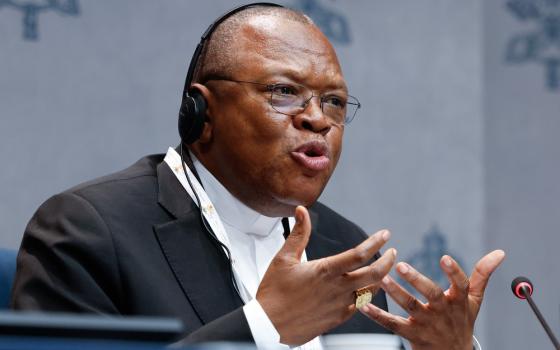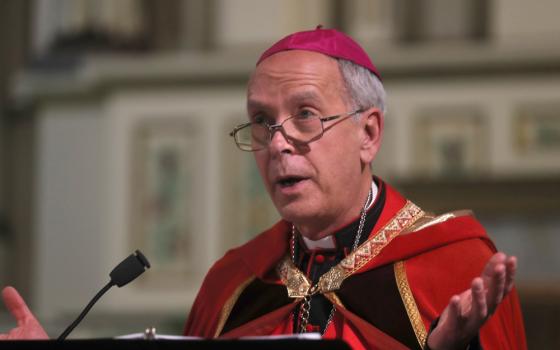
Rome
Pope Benedict XVI leaves tomorrow for an eight-day visit to the Holy Land that even his official spokesperson, Jesuit Fr. Federico Lombardi, concedes is "perhaps the most challenging so far" of his papacy. The pope will spend Friday, Saturday and Sunday in Jordan, the first Arab nation he's visited, before arriving in Jerusalem midday on Monday. He'll then divide the next week between Israel and the Palestinian Territories, including trips to Bethlehem on Tuesday and Nazareth on Wednesday.
As he moves through this itinerary, at least five categories of challenges await the pope.
First up is Catholic-Muslim relations, which will be a primary focus in Jordan, where Benedict is scheduled to visit the King Hussein mosque on Saturday (May 9) and to meet with Muslim leaders. Relations between Catholics and Muslims will also be in the forefront on Tuesday (May 12) in Jerusalem, when Benedict becomes the first pope to visit to Dome of the Rock, considered one of the three holiest Islamic sites (Mecca and Medina, in Saudi Arabia, are the others). The "rock" is the site from which Muslims believe Muhammad ascended into Heaven. While there, Benedict will also meet the Grand Mufti of Jerusalem.
The pope will try to use these occasions to assure Muslims of his good will, since there's still lingering resentment in some circles from his 2006 speech in Regensburg, Germany, linking the prophet Muhammad to violence. Yet he won't restrict himself to damage control, since Benedict has a grand vision of a Muslim-Christian alliance against strains of secularism in the West overtly hostile to religion. For that to work, Benedict believes that Islam must come to terms with extremism -- in his language, it must reconcile reason and faith.
Jordan is a good place to make that argument, since its Hashemite monarchy aspires to be a global leader of moderate Islam. King Abdullah II is planning to greet the pope at the airport in Amman when he arrives on Friday, a departure from protocol that signals how seriously the Jordanian leadership is taking the visit. Ironically, Jordan is also perhaps the only country in the Middle East where the Christian community has grown in recent years, largely because of a massive influx of Iraqi refugees.
Second, Benedict hopes to get Jewish-Catholic relations back on track. Several recent episodes have frayed those ties, including the pope's decisions to revitalize the old Latin liturgy, including a controversial Good Friday prayer for the conversion of Jews, and to lift the excommunications of four traditionalist bishops, including a Holocaust-denier. Especially given that background, the pope's visit on Monday (May 11) afternoon to Yad Vashem, Israel's main Holocaust memorial, is keenly anticipated. (One small but telling indication of the difference in tone between Benedict's visit and that of his predecessor, John Paul II: When John Paul visited Israel in 2000, Israeli security services dubbed their mobilization "Operation Old Friend"; this time, it's "Operation White Robe.")
The Vatican has worked hard to accommodate Israeli sensitivities, including being sure to arrange the pontiff's schedule so that he won't disrupt the Jewish Sabbath. Benedict arrives at Tel Aviv's Ben-Gurion Airport on Monday, and departs the following Friday before sundown.
For those seeking to know the mind of the pope on Jewish-Christian relations, a speech delivered by then-Cardinal Joseph Ratzinger during a 1994 visit to Jerusalem, titled "Reconciling Gospel and Torah," offers a good summary. In it, Ratzinger argued that Jesus was not a "liberal reformer" confronting "an ossified traditionalist hierarchy" in the Judaism of his day, but rather was deeply committed to the Jewish Law -- suggesting, in Ratzinger's words, "a deep unity between the good news of Jesus and the message of Sinai."
The third challenge is the peace process, at a moment when the new Israeli government seems deliberately ambiguous about its commitment to a "two-state solution." Benedict will likely reaffirm the Vatican's long-standing position in support of statehood for the Palestinians and security for Israel, with an "internationally guaranteed special status" for the holy sites in Jerusalem. (Officially, the Vatican has no position on whether Jerusalem should be the capital of one state or two, which officials have long said should be worked out by the Israelis and Palestinians themselves.)
It's a delicate balancing act, and one that may leave no one fully satisfied. Already, some Palestinians have complained that the pope is not visiting the Gaza Strip, although a delegation of a hundred Christians from Gaza are planning to attend the papal Mass at Bethlehem, in the West Bank, on Wednesday (May 13). Meanwhile, a Jewish group called "Defend Jerusalem" is planning a rally Monday in Jerusalem's Zion Square to oppose any surrender of Israeli sovereignty in the city, including East Jerusalem, which most Palestinians see as the future capital of a Palestinian state.
One potentially explosive moment is likely to come on Thursday (May 14), a day Benedict is planning to spend in Nazareth, in the Galilee area of Israel. May 14 is the anniversary of Israel's declaration of statehood in 1948, a day remembered by Palestinians as al-Naqba, or "the catastrophe." The fact that Benedict is scheduled to meet Israeli Prime Minister Benjamin Netanyahu on that day could be read by some Palestinians as a ratification of Israel's version of recent history.
Fourth on the pope's check-list is the fate of Christianity in the Holy Land, which today stands on the brink of extinction. From roughly 20 percent of the population at the time of the British mandate, Christianity has dwindled to less than two percent today, with no more than 130,000-160,000 Christians in Israel and the Palestinian Territories combined. (The bulk lives in Israel.)
The disappearance of Christianity is of more than spiritual concern, since traditionally Arab Christians have acted as a bridge between the Middle East and the West, promoting a pluralistic and essentially secular vision of Arab society. Benedict's visit represents a shot in the arm for the embattled Christians of the region, though it's not clear if the pope, or anyone else, can actually stop the hemorrhaging.
Privately, some local Christians have expressed a degree of ambivalence about the pope's trip. Some Palestinian Christians worry that he won't press Israel hard enough to reach a peace deal, while others complain that his schedule is so top-heavy with ecumenical, inter-faith and diplomatic events that he risks neglecting the local church. For example, the pope is not planning to visit the Church of Saints Simeon and Anna in Jerusalem, where Israel's tiny but symbolically important Hebrew-speaking Catholic community gathers. Estimated at roughly 400 people, the community includes several Holocaust survivors. The group sees itself as a natural bridge between Christians and Jews, but some Jews are wary on the basis of long-standing resentments over perceived Christian efforts at conversion.
Fifth and finally is the question of church-state relations in Israel. The Vatican and the Israeli government have been at loggerheads since the establishment of diplomatic relations 15 years ago over the tax and juridical status of church properties in Israel. Though Benedict is not expected to wade into the details of these negotiations, he may use his meetings with Israeli authorities to insist upon a resolution. Many church officials believe that's an especially urgent task, given that Prime Minister Benjamin Netanyahu has entrusted Israel's interior ministry to the ultra-religious Shas Party. The last time Shas held that portfolio, a near-total freeze was imposed on visas and residency permits for Christian clergy.
Expecting a single week in the Holy Land to change the calculus on all these fronts is almost certainly unrealistic. If Benedict can move the ball on even one or two, however, that alone might qualify the trip as a success.
-------------------------------------------------------------
John L. Allen Jr. is NCR senior correspondent. His traveling with Pope Benedict XVI in Jordan, Israel and the Palestinian Territories May 8-15. Read NCRonline.org daily for his dispatches from the Holy Land.
The stories he has filed so far:
Benedict rides 'peace train' to Nazareth (May 14)
Church in Israel struggles to find its Hebrew voice (May 14)
Today, Benedict belonged to the Palestinians (May 13)
Pope strikes new balance in the Old City (May 12)
The pope and the Hitler Youth, in Benedict's own words (May 12)
Analysis: Benedict's timeless touch noble, but tricky (May 12)
At Yad Vashem, what pope doesn't say makes waves (May 11)
Pope in Israel mends fences, but doesn't pull punches (May 11)
Pope calls on Mideast Christians to perservere (May 10)
Benedict XVI sets new papal record for mosque visits (May 9)
Even in Jordan, Christian-Muslim ties not always easy (May 9)
Emphasis on Islam makes pope's trip an original (May 8)
Five challenges await pope on Middle East swing (May 7)
Pope's Holy Land pilgrimage a huge roll of the dice (May 7)


